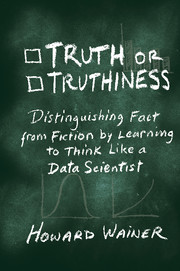Book contents
Introduction
Published online by Cambridge University Press: 05 December 2015
Summary
The modern method is to count;
The ancient one was to guess.
Samuel JohnsonIn the months leading up to Election Day 2012 we were torn between two very different kinds of outcome predictions. On one side were partisans, usually Republicans, telling us about the imminent defeat of President Obama. They based their prognostication on experience, inside information from “experts,” and talking heads from Fox News. On the other side, were “the Quants” represented most visibly by Nate Silver, whose predictions were based on a broad range of polls, historical data, and statistical models. The efficacy of the former method was attested to by snarky experts, armed with anecdotes and feigned fervor, who amplified the deeply held beliefs of their colleagues. The other side relied largely on the stark beauty of unadorned facts. Augmenting their bona fides was a history of success in predicting the outcomes of previous elections, and, perhaps even more convincing, was remarkable prior success, using the same methods, in predicting the outcome of a broad range of sporting events.
It would be easy to say that the apparent supporters of an anecdote-based approach to political prediction didn't really believe their own hype, but were just pretending to go along to boost their own paychecks. And perhaps that cynical conclusion was often true. But how are we to interpret the behavior of major donors who continued to pour real money into what was almost surely a rat hole of failure? And what about Mitt Romney, a man of uncommon intelligence, who appeared to believe that in January 2013, he was going to be moving into The White House? Perhaps, deep in his pragmatic and quantitative soul, he knew that the presidency was not his destiny, but I don't think so. I believe that he succumbed to that most natural of human tendencies, the triumph of hope over evidence.
We need not reach into the antics of America's right wing to find examples of humanity's frequent preference for magical thinking over empiricism; it is widespread. Renée Haynes (1906–94), a writer and historian, introduced the useful concept of a boggle threshold: “the level at which the mind boggles when faced with some new idea.”
- Type
- Chapter
- Information
- Truth or TruthinessDistinguishing Fact from Fiction by Learning to Think Like a Data Scientist, pp. 1 - 10Publisher: Cambridge University PressPrint publication year: 2015



